Unveiling the Hidden Threat: Patrick Bet-David on the ‘Reverse Market Crash’ No One’s Talking About.
The world-renowned businessman says there’s an even worse scenario than the stock market collapsing.
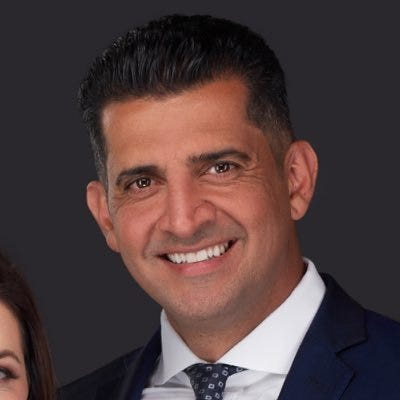
Hello, you amazing people!
While I'm here watching the rain in Bromsgrove, UK, I've been deep in the weeds researching everything finance. I've made my latest piece free to read, but if you'd like to support my work with a paid subscription, it means the world to me and keeps my writing going. Thanks for being a part of our journey!
The rich will get richer, and the poor will get poorer, but the divide will be on steroids this time.
Patrick Bet-David’s hallmark is coming from the dirt and triumphing through adversity.
You can sprinkle in some self-made luck.
At ten, he escaped Iran for a German refugee camp to avoid the revolution where civilians were getting publicly executed.
For most people, it’s an unrelatable hurdle, but Patrick says the experience shaped his core belief because when he left, he found refugees were all escaping for the same reason.
Patrick Bet-David — “The most valuable thing that we wanted and were willing to sacrifice everything — to go to a different country where we didn’t speak the language and then come to America was for one word, and it starts with the letter “f”, and it’s called “freedom.”
PDB first landed on my radar eight years ago through a video that melted the internet.
The 90-second clip took me and 25 million other viewers on a journey, and I’ve been immersed in his no-nonsense message ever since.
I remember watching the video at a time when entrepreneurship and Silicon Valley founders were on a pedestal. He wiped away the fluff and showed what sacrifices look like.
With few followers, zero marketing, and no boost or paid promotion, the viral hit depicted PDB’s struggle through entrepreneurship.
It shows Patrick knocking on doors, getting rejected, having no money, the stress of people deceiving him, and then a final fed-up scene of him slumped over the steering wheel of his banged-out Ford Focus.
Bet-David says his father had a heart attack caused by the stress of financial difficulties — “That exact scene of me gripping the steering wheel is the scene I had in 2003 when my father had a heart attack. I was furious. I went downstairs (from the hospital), sat in the car, and cried like a little baby”.
Patrick says the financial stress almost cost his dad his life — Mehrdad Bet-David was physically drained from driving three hours daily on the 405 freeway to work at the $ — 99 store.
Patrick Bet- David — Source
“If you go through that moment, you’ll be introduced to a new better version of you — it’s very difficult to describe — you’ve gotta go through it, and if you fight through that moment, that’s when the hero is around the corner”.
PDB found his hero in the mirror.
Today, he has an estimated net worth of $200 million, growing his insurance firm to 17,000 people and 150 offices.
In one of his most recent videos, which is also going viral, the man who speaks about the economy and modern finance now says there’ll be an even worse scenario than the prospect of a stock market collapse.
It’s a phrase he coined as a“reverse market crash”.
Let’s dive in.
House prices are increasing, but it’s not what it seems.
The Federal Reserve, trying to tackle the rising cost of living, has increased interest rates to a 22-year high of 5.5%, which has my lunch times coffees costing me $8. Yuck.
What once looked like a free lunch after drowning in ‘stimmy cash’ has left people with eye-watering mortgage payments for those who didn’t secure lower interest rates.
There’s a bizarre twist.
House prices have increased in the U.S. primarily because of the lack of people wanting to sell.
The average home sale price, as reported, currently stands at $430,300. It’s an increase of $14,200 (3%) from the previous quarter, even after a correction.
For a cost of living crisis, something is starting to smell fishy.
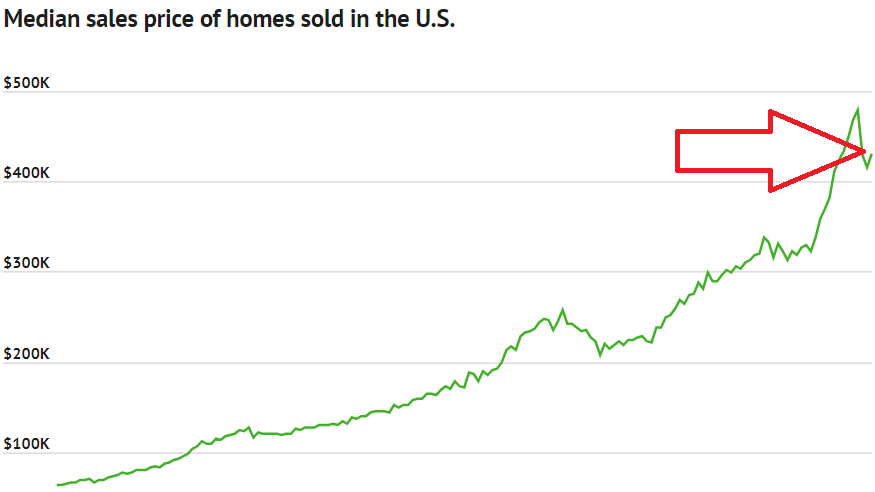
PDB says Fed chair Jerome Powell can not, under any circumstances, succumb to any election pressure to reduce interest rates because it’ll result in the “Rich and Poor divide but on steroids”.
We’re seeing the Fed address inflation with their only tool, interest rate hikes, which is working as it’s down from 8.2% to 3.7%.
But the consumer economy is still doing well, with unemployment the lowest it’s ever been since the 1970s at 3.8%.
Patrick says these are perfect conditions for a “reverse market crash”, and it’s something hardly anyone is talking about.
Patrick Bet-David — Source
“A reverse market crash, you know what’s gonna happen? What would happen if Jerome Powell decreased rates to 5%, 4%, or 3%? Do you know what would happen today? You think that house that’s $900,000 that the value hasn’t moved even when they (banks) raised the rates to 8%, that $900,000 house will be $1.4 million. And if the DOW Jones suddenly goes to 48,000, you know what would happen? This whole concept of Rich getting rich or poor getting poor, it became Rich getting rich or poor getting poor on steroids.”
There’s only one thing a government can do when it finds itself in this situation.
The answer is to print more money to service debt.
Jamie Dimon, Billionaire chairman of JP Morgan Chase, in his quarterly report, says, “It’s the most dangerous time the world has seen in decades”.
Ray Dalio, one of the most outstanding hedge fund managers ever, says, “You can’t keep spending money and expect inflation to come down because when you restimulate, asset prices go back up again”.
Governments have debt likely to keep growing because it’ll cost more to pay off the existing debt with high interest rates.
As debt keeps rising, Dalio says, “Governments will need to sell more debt, so there will be a self-reinforcing debt spiral that will lead to Market-imposed debt limits. Central banks will be forced to print more money and buy more debt as they experience losses and deteriorating balance sheets.”
Dalio is saying that as the deficit compounds, central banks may have to print more money and buy more debt (government bonds), which will increase the money supply and cause asset prices to rise.
Because new money is inflationary and stimulative, people who own financial and physical assets will win the most.
The lowest earners and bottom tier of society will bleed the most from the cost of living.
Here’s the worst-case scenario.
Patrick Bet-David says income inequality has led to people fleeing Venezuela.
The yearly inflation rate, which has dropped from 686% in 2021 to 234% in 2022, is now back up to 395%.
They’re getting destroyed.
Put it into context, U.S. inflation is 3.7%.
PDB says America could have the same fate, provided Powell doesn’t succumb to election pressure to reduce rates and restimulate.
He thinks we must be in this high-interest rate climate for a “few years”.
When the money printer purred like a well-oiled machine, the Federal Reserve printed approximately $3.3 trillion in 2020 alone.
That’s one-fifth of all U.S. dollars in circulation in the same year.
A recent survey revealed the number of those living in poverty in Venezuela had fallen from 65.2% to 50.5% in 2022, but income inequality had continued to widen.
The poorest 10% in Venezuela survive on just $8 a month, compared to $553 for the wealthiest 10%.
Since 2015, more than 7 million out of the 28 million population of Venezuelans have fled their country (25%).
When you see how the Venezuela stock market is performing relative to the people trying to survive and the mass exodus, it highlights how wide the “rich and poor” gap is getting.
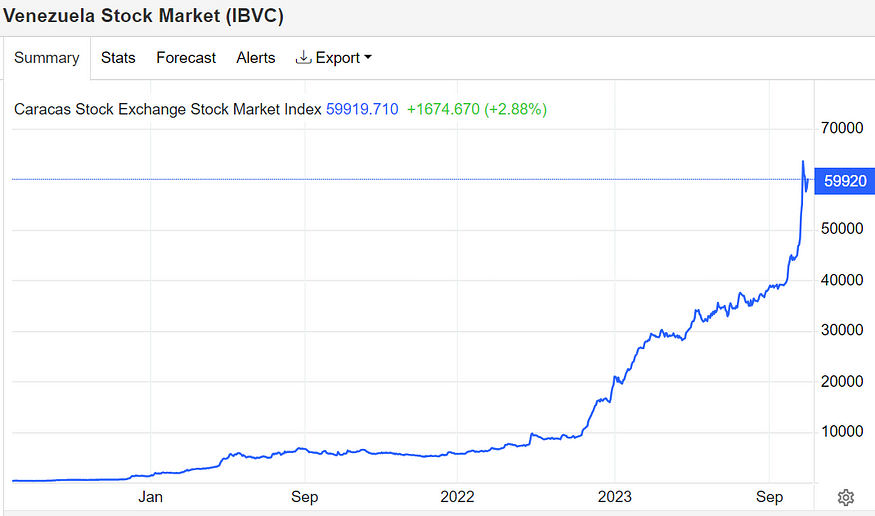
Final Thoughts.
It’s not all doom and gloom.
Well kinda.
Here’s a thread of hope from the fed chair, who thinks his forward-looking indicators suggest there won’t be a recession.
Jerome Powell — Source
“So the staff now has a noticeable slowdown in growth starting later this year in the forecast, but given the economy’s resilience recently, they are no longer forecasting a recession.”
I’m not so convinced.
It doesn’t solve the problem for the 80% of Americans who live paycheck to paycheck.
Excess money is still sloshing around the system from when it rained pandemic money, but it’s about to dry up, and all the indicators say so.
Credit card debt is heading to Valhalla, and savings rates are dropping faster than a broken elevator.
In August, people saved only about 3.9% of their disposable income, much lower than the usual long-term average of around 8.9%.
Credit card balances total over $1.031 trillion, the highest it’s ever been in U.S. history, and it seems that we are universes away from balances in 1999 of $478 billion.
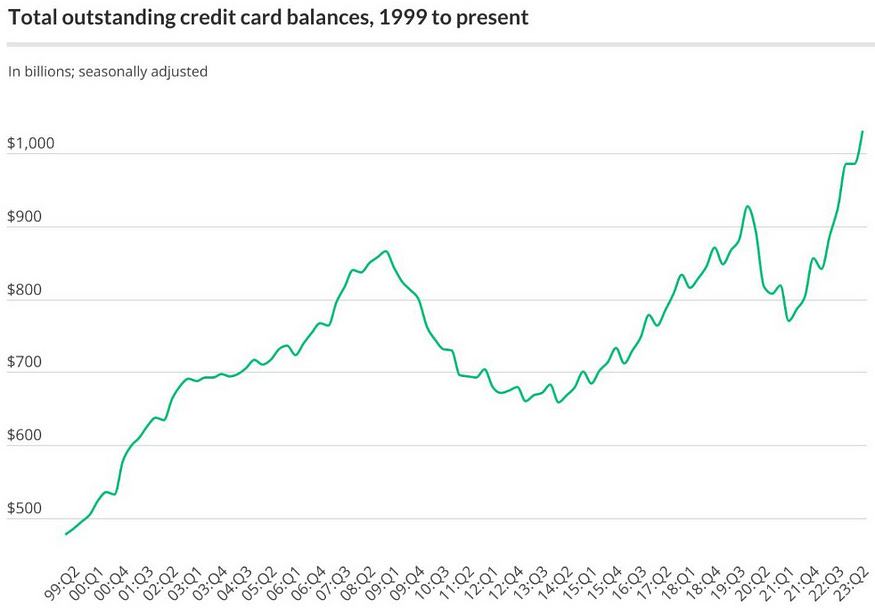
PBD say the price of everything will become an obstacle for people and an even more significant hurdle for those with consumer debt like credit cards.
As he says — “We think the economy is doing well, but it’s a lie because the top 1% are crushing it while everyone else is getting destroyed”.
It’s a point I agree with.




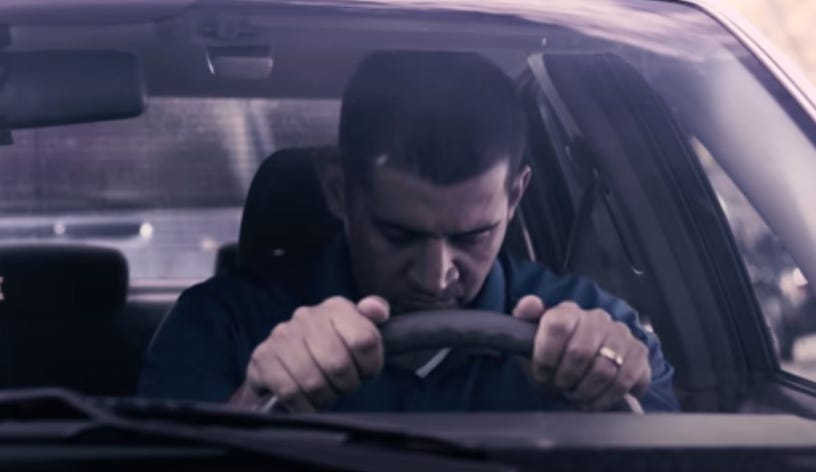
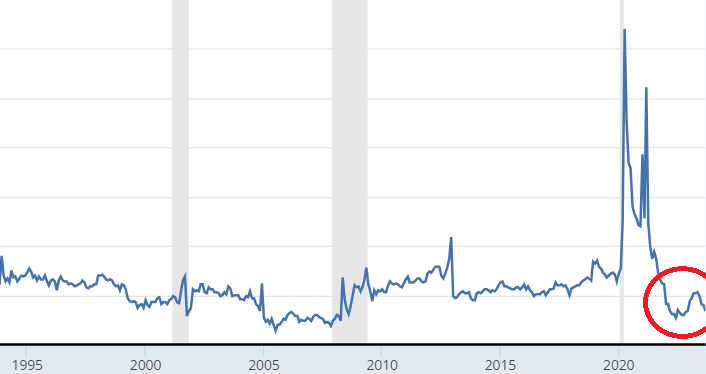
I also signed up today to the Medium Partner Program. I wonder if I find the courage to put out my thoughts and feelings. 🤔
Hallo Jayden.
I am doing fine and enjoying to learn about life on behalf of my adventure into crypto.
It has been a great path to walk on.
Meeting people like you is really enjoyable.
Widening horizons and opening up for adventure is feeling great. Leaving behind more and more of my grown-into package and finding myself in amongst all that wonderful moves our reality is currently having , feels great.
Waking up to a new reality and being actively part of it thrills me.
I am enjoying building up my tourist guide business, simultaneously getting involved in crypto and having still lot of spare time for myself.
Thank you for supporting me in all that moves.
See you soon.